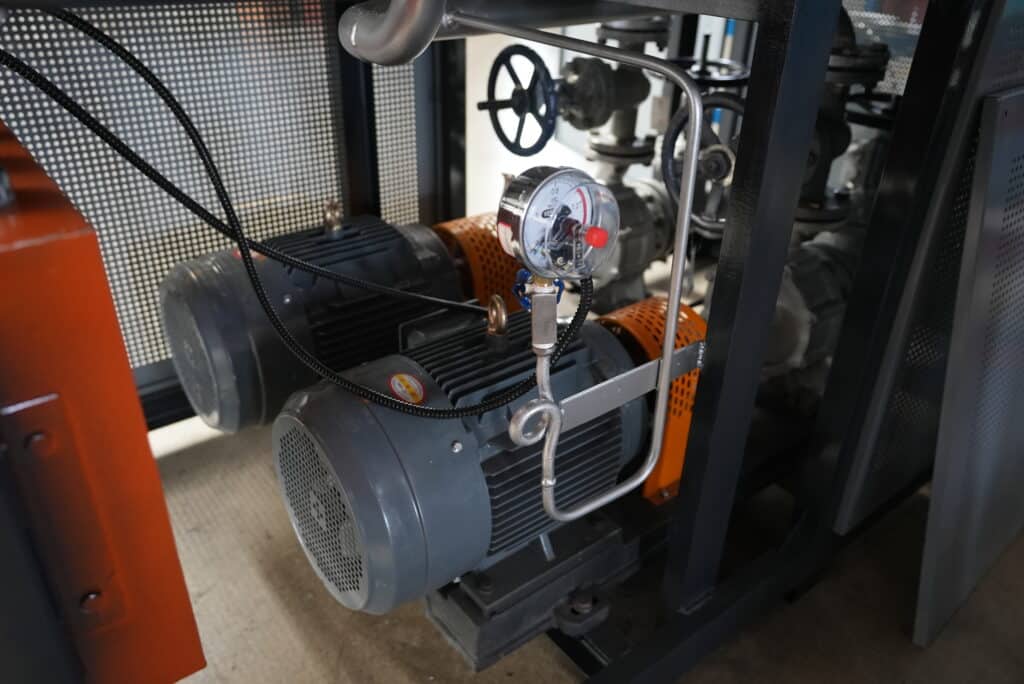A heat transfer oil boiler transfers heat to the desired equipment or process by heating a heat carrier fluid, usually synthetic oil, and then circulating it through a closed loop system. Unlike conventional steam boilers, thermal oil boilers transfer heat through the heat carrier oil without the need for a high pressure system, making it a significant advantage in many industrial applications.

The main components of the heat transfer oil boiler system
- burners: The burner is responsible for igniting the fuel and generating the required heat, which in turn heats the heat carrier oil. The efficiency of the burner directly affects the thermal efficiency of the entire boiler system.
- heat exchanger: The function of the heat exchanger is to transfer the heat generated by the burner to the heat carrier oil. It is usually made of a metallic material with good thermal conductivity and can effectively transfer heat to the oil.
- pump (loanword): The pump is responsible for circulating the heat carrier oil through the system, ensuring that the heat is transferred evenly to the various heating points. The stability of the pump operation is important to maintain the thermal efficiency and stability of the system.
- expansion tank: Expansion tanks are used to compensate for the expansion of thermal oil due to temperature changes during the heating process. It is an integral part of the design of the thermal oil boiler to ensure the safe operation of the system and to prevent the oil from overpressurising due to expansion.
Working steps of heat transfer oil boiler
- Burner heating thermal oil: The burner generates heat and heats the heat carrier oil by igniting a fuel (e.g. natural gas, fuel oil, etc.). The temperature of the hot oil increases with the heat output of the burner.
- Hot oil is piped to the heating point: The heated thermal oil is transported through insulated pipework to the equipment or process point to be heated, e.g. reactors, drying equipment, etc. These heating points usually have specialised heat exchange units to receive the hot oil and transfer the heat to the target material.
- Hot oil is returned to the boiler for reheating: After the heating process, the cooled hot oil is returned to the boiler for reheating. Through this cycle, the hot oil continuously transfers heat and keeps the production process running efficiently.
Advantages of heat transfer oil boilers
Because of its unique working principle and structure, thermal oil boiler is widely used in many industries such as chemical, petroleum, food processing, pharmaceutical and so on. Compared with the traditional steam boiler, thermal oil boiler has the following advantages:
- No need for high pressure operationThermal oil boilers do not require steam pressure and are therefore safer to operate. It provides heat through a non-compressed oil circulation, avoiding the safety hazards that can be associated with high pressure systems.
- Highly efficient heat transfer capability: Because heat carrier oils are highly conductive and can withstand high temperatures, thermal oil boilers are able to transfer heat efficiently at higher temperatures. Its thermal efficiency is high, and energy utilisation is greatly improved.
- Precise temperature control capabilityThermally Conducted Oil Boilers provide stable and precise temperature control for a wide range of applications from low to high temperatures. This precise temperature control is essential for a number of industrial processes with stringent temperature requirements.
- System stability and low maintenance requirements: Thermally-conducted oil boilers typically operate in a low-pressure environment, which reduces the impact of system pressure fluctuations. It has a relatively simple structure, low maintenance requirements and a long service life, which can bring lower operating costs for enterprises.
- Less energy consumption: Thermally Conducted Oil Boilers significantly reduce energy consumption through efficient heat transfer and low energy operation. This not only helps to reduce production costs, but also helps to reduce the environmental impact.
Application areas of heat transfer oil boilers
- Chemical industry: In the chemical industry, many reaction processes require precise temperature control, and thermal oil boilers can provide a stable heat source for these reactions, ensuring that they are efficient and safe.
- Food processing industry: In food processing, especially in baking and frying, temperature uniformity is critical. Heat transfer oil boilers ensure the quality of food processing through stable temperature control.
- pharmaceutical industry: Many production processes in the pharmaceutical industry have stringent temperature requirements, and thermal oil boilers provide precise heat control to safeguard the quality and safety of pharmaceutical products.
- Oil and gas industry: In the oil and gas industry, thermal oil boilers are commonly used in processes such as oil refining and catalytic cracking, where they are able to work stably in high-temperature environments to ensure the efficient operation of oil processing.
Thermal oil boilers have become indispensable heating equipment for many industries due to their high efficiency, low pressure, safety and precise temperature control characteristics. Whether in the chemical industry, pharmaceuticals, food processing, or oil and gas and other fields, thermal oil boilers are able to provide a stable and reliable heat source for industrial production. Through the reasonable selection and design of thermal oil boiler system, enterprises can not only improve production efficiency, reduce energy consumption, but also enhance the overall safety and stability.
Our company can non-standard custom products, click the menu bar to contact us to customise, you can also refer to the first!product pageAppreciate our company's products oh!
Recommended Reading:
